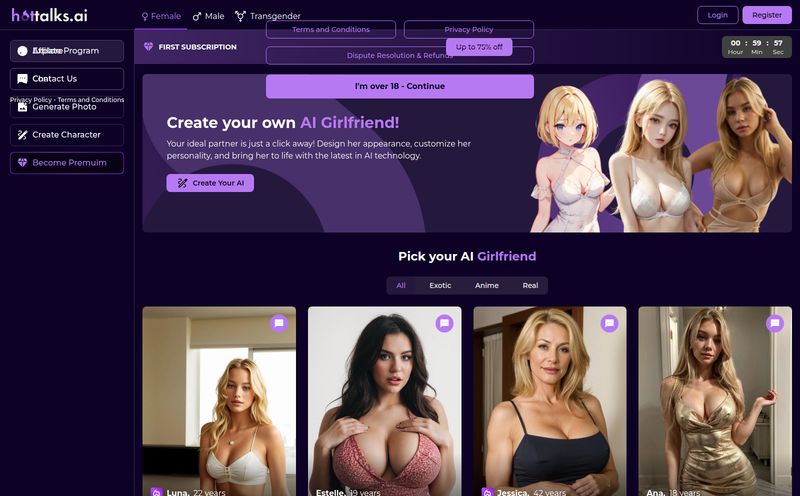As someone who's spent years neck-deep in SEO and digital trends, I've seen countless tools pop up, make a huge splash, and then vanish without a trace. It’s the digital circle of life. One minute you're the talk of Product Hunt, the next you're a forgotten bookmark. So, when a colleague mentioned the "Dirty Pickup Lines AI," my curiosity was piqued. An AI dedicated to generating specifically NSFW, raunchy, and supposedly hilarious pickup lines? In this AI gold rush, it sounded both inevitable and ridiculous. I had to see it for myself.
I fired up my browser, typed in the name, and clicked the top result. And what was I greeted with? Not a slick, dark-mode interface ready to serve up some questionable chat-up lines. Nope. I got this:

Visit Dirty Pickup Lines
A cold, sterile "404 NOT_FOUND." Code: 'DEPLOYMENT_NOT_FOUND'.
Ah. A ghost in the machine. A digital relic. For an SEO guy, a 404 page is both a dead end and a story. It means something was here, and now it's gone. So, this isn't going to be a review. Instead, let's do a little digital archaeology. Let's talk about what the Dirty Pickup Lines AI was, why it probably disappeared, and what it tells us about the current state of AI tools.
A Trip Down Memory Lane: What Was This Thing Anyway?
From what I could gather by digging through the internet's cached memory and some forum discussions, the Dirty Pickup Lines AI was exactly what it said on the tin. It was a simple, free-to-use web tool. You’d give it a scenario—like "at a hardware store" or "during a zombie apocalypse"—and its little AI brain would churn out a unique, and often deeply inappropriate, pickup line filled with sexual innuendo.
The appeal was obvious. It was pure, unadulterated novelty. It was the kind of thing you’d share with your friends for a cheap laugh. It required zero effort, no signup, and no credit card. In the world of traffic generation, "free" and "funny" are a potent combination. It promised quick, shocking entertainment, a perfect distraction for a few minutes. Simple, effective, and built for virality.
The Features That Made It... Memorable
This wasn't some complex, multi-layered SaaS platform. Its beauty—and probably its downfall—was its simplicity. Based on its reputation, the tool really only did a few things, but it did them with a certain flair.
Scenario-Specific Raunchiness
This was its core gimmick. The ability to get a custom-tailored dirty pickup line for any situation was, I admit, pretty funny. The absurdity of generating a raunchy line for a scenario like "at a funeral" or "in a library" is where the humor lived. It was a one-trick pony, but that trick was pretty specific and attention-grabbing.
Completely Unfiltered Humor
The main selling point was that it was explicit. Unlike mainstream AIs like ChatGPT, which have more guardrails than a bowling alley for toddlers, this tool was designed to be offensive. It leaned into the shock value. This, of course, is a double-edged sword. What's hilarious to one person is just plain gross to another. I've always felt that humor AI is one of the hardest things to get right, and going the "dirty" route is like trying to do it on expert mode.
The Price Was Right
It was free. You can't beat free. This meant anyone could try it, share it, and move on without a second thought. This model is fantastic for generating initial buzz but, as we'll see, not so great for long-term survival.
An SEO's Post-Mortem: Why the 404 Error?
So, why is it gone? While I don't have an official statement from the anonymous creators, my years of experience watching projects like this rise and fall point to a few likely culprits. This is where we get into the nuts and bolts of why so many of these fun, niche AI wrappers disappear.
The Monetization Problem
Running an AI model costs money. Whether it’s paying for OpenAI's API, hosting the model yourself, or just keeping the servers on, there's a constant cash burn. A free tool with no ads, no subscription, and no paid features is a ticking financial time bomb. The developers were likely paying out of pocket for everyone's five minutes of fun. Eventually, the bill comes due, and if the passion or the funds run out, you pull the plug. It's a story as old as the internet itself.
The Moderation Nightmare
Here's the big one. An AI that is designed to generate explicit content is a moderation and liability minefield. What happens when it crosses the line from "raunchy" to genuinely hateful or illegal? According to some whispers, the generated lines were publicly displayed on the site. Can you imagine the kind of stuff that would show up there? It would be a constant battle to keep the platform from becoming a toxic cesspool. Companies spend millions on content moderation; a free side project stands no chance. This is a lesson many are learning teh hard way, as discussed in articles about the challenges of AI moderation.
The Novelty Wore Off
Let's be honest. How many times would you actually use a dirty pickup line generator? It's a great gimmick, but it has almost zero staying power. You use it, you laugh, you close the tab. User retention was probably abysmal. In SEO and traffic, we're always looking for sustainable growth, not just a one-hit wonder. This tool was the digital equivalent of a novelty party song—fun at first, but you're not adding it to your daily playlist.
The Bigger Picture: A Lesson from a Dead AI Tool
The rise and fall of the Dirty Pickup Lines AI is a perfect little case study for the current AI boom. We're seeing an explosion of "GPT wrappers"—thin applications built on top of powerful base models like those from OpenAI. It's easier than ever to create a tool that does one specific, flashy thing.
But it's a stark reminder that a cool gimmick isn't a business model. Without a plan for monetization, moderation, and long-term user value, most of these tools are destined to become 404 pages. They are shooting stars—bright, exciting, and gone in an instant.
For anyone building in this space, it's a critical lesson. Think beyond the launch. How will you pay for it? How will you police it? And why will people come back tomorrow? For the rest of us, it’s just a funny reminder of the wild, weird, and often fleeting nature of internet trends.
Frequently Asked Questions (FAQ)
- What was the Dirty Pickup Lines AI generator?
- It was a free, online AI tool that generated explicit and sexually suggestive pickup lines. Users could input a scenario, and the AI would create a unique, raunchy line tailored to that situation.
- Why can't I access the Dirty Pickup Lines AI website?
- The website currently displays a "404 NOT_FOUND" error, which means the deployment has been taken down. This is likely due to high operational costs, content moderation challenges, or the project simply being abandoned by its creators.
- Was the Dirty Pickup Lines AI free?
- Yes, one of its main draws was that it was completely free to use. This contributed to its initial viral popularity but likely also to its financial unsustainability.
- What were the risks of using the tool?
- The primary risks were twofold. First, the content was explicitly adult and could be offensive to many users. Second, some reports indicated that generated lines were publicly displayed, creating a potential privacy and moderation issue.
- Are there good alternatives to the Dirty Pickup Lines AI?
- While direct replacements for explicit content generation are niche, you can use mainstream AI writing assistants like Jasper or Copy.ai. By crafting specific prompts, you can guide them to create funny, flirty, or clever lines with far more control and fewer content risks.
- Is it hard to build a tool like this?
- Building a basic version of a tool like this (a "GPT wrapper") has become relatively easy for developers thanks to APIs from companies like OpenAI. However, building a sustainable, safe, and profitable tool is significantly more difficult, which is why many of them disappear.
Conclusion
So, we came looking for a laugh and found a digital graveyard instead. The story of the Dirty Pickup Lines AI is more than just a tale of a defunct website; it's a snapshot of the AI industry right now. It’s chaotic, innovative, and full of projects that burn brightly before burning out. It serves as a great lesson on the difference between a fun idea and a viable product. So, let's pour one out for the Dirty Pickup Lines AI. It was weird, it was wild, and it was a perfect example of the fleeting absurdity of the internet. Rest in peace, you crazy little AI.
References and Sources
- World Economic Forum - Why AI-powered content moderation is so difficult to get right
- TechCrunch - The hidden costs of running AI models are starting to emerge
- (Archived) DirtyPickupLinesAI.com - The now-defunct website for the tool.



